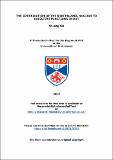The contribution of the subthalamic nucleus to executive functions in rat
Abstract
Lesions of the subthalamic nucleus (STN) alleviate the cardinal signs of
idiopathic as well as MPTP-induced Parkinson’s disease in primates. For this
reason, the STN is a target for clinical treatment of Parkinson’s disease using
deep brain stimulation. Despite its small size, the STN plays a vital role in the
cortico-basal ganglia-thalamic network. However, the functional features of the
STN have yet to be fully uncovered. The research presented in this thesis
examines the functions of the STN by measuring behavioural changes resulting
from STN lesions in rats performing executive abilities.
In the first experiment, a ‘signal change’ reaction time task was developed
and the performance of humans and rats was compared. The main findings
were that although humans and rats used different strategies in the task, the
task did challenge the ability to inhibit unwanted responses. In the second and
third experiments, the effects of bilateral lesions of the STN on performance of
two variants of the ‘signal change’ task were examined. Rats with the STN
lesions were able to inhibit responses when under stimulus control, but were
less able to inhibit responses that were not under stimulus control. In the final
experiment, the effects of lesions of the STN on inhibitory control in a nonmotor,
cognitive domain were examined. Rats with STN lesions were not
impaired on reversal learning, suggesting intact inhibition of previously
rewarded responses. The rats with STN lesions did show impairments in
selective attention which resulted in an inability to form an attentional set.
Together, these findings challenge the conventional view that the STN
simply plays a global inhibitory role. Rather, the contribution of the STN to
inhibitory control is more complex and neither the motor nor the cognitive
effects of the lesions are easily explained simply as a failure of inhibition.
Type
Thesis, PhD Doctor of Philosophy
Collections
Items in the St Andrews Research Repository are protected by copyright, with all rights reserved, unless otherwise indicated.

